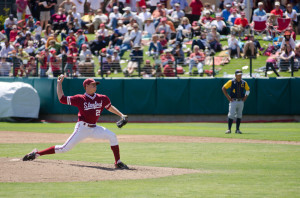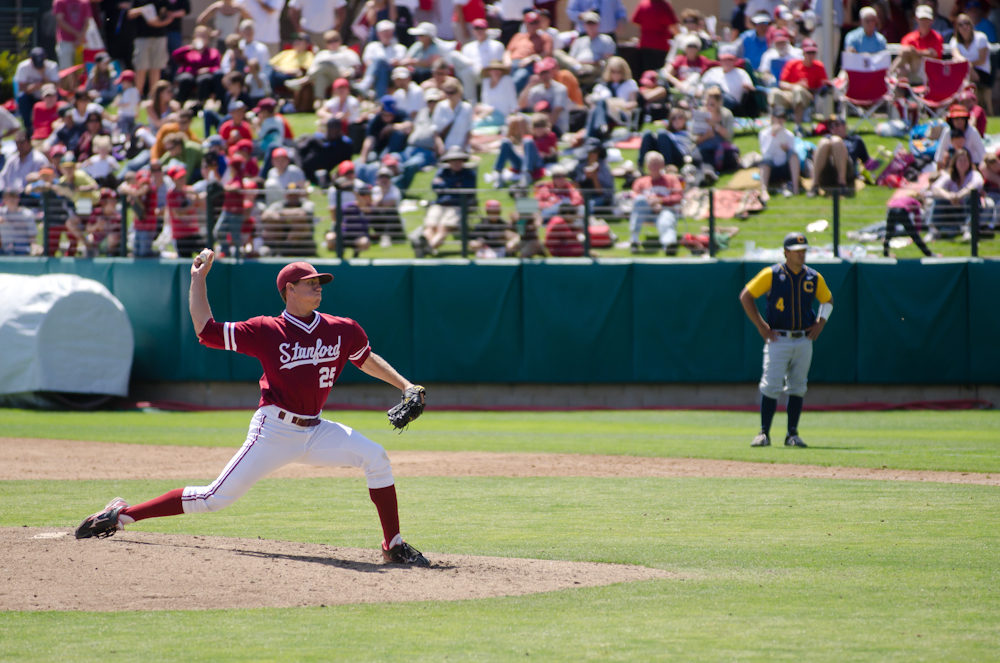A disappointing weekend against Cal at Sunken Diamond wrapped up a conference season of missed opportunities for the No. 11 Stanford baseball team.

With conference-leading Oregon losing all three games to Oregon State, the Cardinal would have finished in a three-way tie for the Pac-12 championship had it swept the unranked Bears. Instead, Stanford (38-16, 18-12 Pac-12) finished in a three-way tie for fourth place after losing twice, marking the second-straight year that the preseason-frontrunner Cardinal has slipped to the middle of the pack.
Stanford was outlasted by its cross-bay rival in a perplexing 18-inning opener before a 15-5 bludgeoning by the Bears (29-25, 12-18) on Saturday, but still enters the postseason on a winning note with a 5-3 Sunday win.
The final victory came just hours after the announcement that the Farm would be one of 16 regional sites in the NCAA Tournament, with Stanford set to host Fresno State, Michigan State and Pepperdine next weekend. In the 14 years that the Cardinal has hosted a regional, it has reached the College World Series 11 times.
As he prepares to make another run at Omaha, head coach Mark Marquess isn’t putting too much stock in this weekend’s series loss.
“The crazy thing is that you don’t know. You can win all three [in your last series] and not play well in the regional, or you can lose all three and then all of a sudden you play [better],” he said. “So it really is a second season—I tell the players that—and there’s enough time off that there’s not necessarily a carryover.”
There was a carryover from the Cardinal’s Saturday night loss, from the Bears’ epic 18-inning win in the series opener that is tied for the longest game in each school’s recorded history. Cal played an 18-inning game in 1943, and Stanford, whose records only date back 15 years, had one of its own in 2002.
In the big picture, the 4-5 loss eliminated the Cardinal from Pac-12 title contention, snapped its eight-game winning streak and likely threatened its chances at hosting a Super Regional.
But all 569 pitches of the five-hour and 58-minute contest were bizarre entertainment for the 2,743 fans who packed into Sunken Diamond—or, at least those who stuck around for the end of the chilly marathon.
Junior righthander Mark Appel (9-1) left with a 2-1 lead and eight strikeouts to his name through seven innings, but the Bears clawed back with an unearned run in the eighth. The Cardinal had runners in scoring position in each of the next two innings but couldn’t convert, sending the game to extras.
Sophomore righty A.J. Vanegas held Cal off the scoreboard until the 12th, when senior catcher Chadd Krist battled back from 0-2 with two outs and lined a two-run double to put the Bears ahead 4-2.
An inexplicable bottom of the 12th then left everyone—crowd, dugouts, press box and all—in shock.
With one on and two out, sophomore first baseman Brian Ragira walked and right fielder Austin Wilson doubled, narrowing the margin to one. An intentional walk loaded the bases for pinch-hitter Brett Michael Doran.
With the count at 1-2, Doran shot a ball deep to left field which landed just foul and hit the wall on one bounce. But incredibly, home-plate umpire Billy Speck ruled the play a home run, apparently believing that the ball had hit the foul pole and bounced back into the playing field.
Cardinal bats and helmets were strewn everywhere, and both teams streamed out of their dugouts: Stanford celebrating in centerfield, and Cal contesting the call down the third-base line.
The play was eventually reversed, but even after the Cardinal’s equipment had been picked up, the drama persisted. On the very next pitch, Doran hit a cue shot between first base and the mound, advancing everyone easily to tie the game.
The ball was so perfectly placed, in fact, that Wilson had enough time to come around from second for the winning run. But he stutter-stepped at third base and was thrown out at the plate, then ejected for slamming his helmet in frustration.
The teams would battle back and forth for six more innings, with Stanford using four different catchers while several batters for both teams registered eight at-bats.
It would be Cal’s star shortstop Tony Renda who broke through in the 18th. The Bears put a runner in scoring position on the game’s 10th sac bunt, before Renda came to the plate at 0-for-7 on the evening. His eighth time up was the charm, though, as Renda singled on a full count to put his team ahead 5-4.
Junior shortstop Kenny Diekroeger—also 0-for-7 at that point—led off the bottom half of the inning with a double, but the Cardinal could not bring him home.
The deflating loss seemed to stick with Stanford the following afternoon, as the Bears captured their first series win on the Farm since 2008 in dominant fashion.
“It didn’t bother Cal at all. They came out and played well, hit the ball around the ballpark and really gave us a good beating, playing much better than we did in all phases of the game,” Marquess said. “Unless they got more sleep than we did, I don’t know why.”
“They just gave a good whipping,” he added.
It seemed as if the Bears, having used Saturday starter Justin Jones as a reliever in the opener, would have an off pitching day, but instead it was the Cardinal that was exposed on the mound. Redshirt junior lefthander Brett Mooneyham lasted just 3.2 innings, allowing eight earned runs and 10 hits, and fellow lefty Garrett Hughes couldn’t record a single out in relief.
Cal got on the board with two outs in the second inning, scoring four runs with two outs after Krist—who leads the Pac-12 in doubles and set a Cal career record over the weekend—had another two-bagger to ignite a rally. Stanford loaded the bases in the bottom half and got back two runs on a wild pitch and an error by catcher Andrew Knapp, but the Bears limited the damage to just that pair of scores
It would be the visitors’ ability to prevent big innings—and put up crooked numbers of their own—that would turn the tide so dramatically. After five more Cal runs in the fourth, the Cardinal again loaded the bases with one out but could only tally once to make it 9-3.
Two-out hitting got each team two more runs in the sixth, but some sloppy seventh-inning fielding extended the Bears’ lead to 14-5 and fully put the game out of reach.
When all was said and done, Cal had burned through eight Stanford pitchers and became the first team all year to score in double-digits against the Cardinal.
“I just think you’ve got to execute a little better,” junior catcher Eric Smith said after the series. “You’ve just got to throw the ball over the plays a little better, make the routine plays, execute on offense a little better.”
“It was good to see that we came out and fought real well on Sunday,” he added. “We got that win and avoided the sweep.”
To that point, it had been Krist’s three doubles and Cal leftfielder Danny Oh’s 6-for-10 performance through two games that had highlighted the weekend’s hitting. But Stanford’s bats started to emerge as well on Sunday, with junior leftfielder Tyler Gaffney earning his first start of the weekend and going 3-for-5 in the finale.
After Cal third baseman Mitch Delfino opened the scoring with a solo home run in the second, junior centerfielder Jake Stewart struck back with a three-run home run. The Bears tallied in the third to make it 3-2, but the Cardinal responded with sophomore second baseman Brett Michael Doran driving in a run.
Krist’s fourth double of the weekend led to another Cal run in the fourth, but Gaffney kept the Cardinal cushion at three with a solo shot to lead off the bottom half of the frame.
From there on out, the pitchers were in control. Stephen Piscotty (4-2) gave up just four hits through seven innings, and fellow junior righty Sahil Bloom cleaned up the final two innings to keep Stanford ahead 5-3. The Bears were outhit by the Cardinal for the first time all weekend.
Stanford now prepares to host Fresno State (30-26, 8-10 Western Athletic Conference) in its regional opener. The two squads met for a three-game series in the third week of the season, with the Bulldogs handing then-No. 1 Cardinal its first loss of the season before Stanford responded with a 16-0 Saturday win.
“Well, it’s good that we’re familiar with them,” Marquess said. “The bad thing is that Appel’s only loss is to Fresno State, so that’s a real tough four-seed.”
Marquess also noted Fresno State’s 2008 College World Series title, when the Bulldogs were also a No. 4 seed in their regional and made one of the greatest Cinderella runs in college sports history en route to the championship.
No. 3 Michigan State and No. 2 Pepperdine will play in the early game, scheduled for 1 p.m., before No. 1 Stanford and No. 4 Fresno State meet at 6 p.m. All games in the regional will be televised on ESPN3.com.
